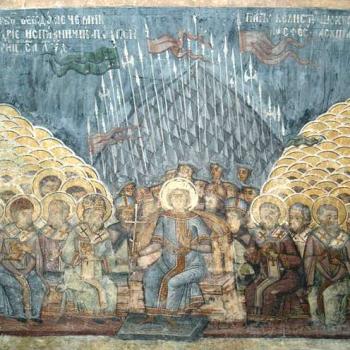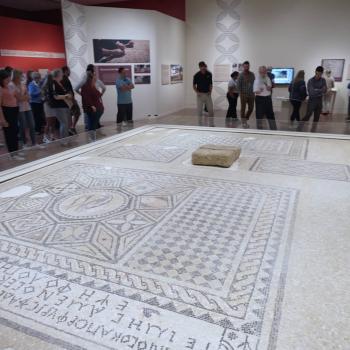On May 6, 2012, I made a promise.
With my wife at my side and standing before five Trappist monks at a monastery near Atlanta, I made my life promises as a Lay Cistercian—a layperson who has sought out the spiritual guidance of the monks in a formal way. After five years of preparation and prayer, the day came when, in a ceremony both solemn and joyful, I promised to give myself to a daily conversion of life as my free response to the love of God; to live in a spirit of contemplative prayer, sacrifice, and obedience to the call to holiness; and to accept both Cistercian spirituality and the Rule of St. Benedict as my guides for living the good news of Christ.
So what does that all mean?
I once heard musician Robert Gass, who is renowned for recordings of sacred chants from around the world, say that the Sanskrit chant Om Namaha Shivaya can roughly be translated as "Yay, God!" He was being facetious, of course, but within that joke is a kernel of truth. Sometimes our wordy prayers or theologies (or, for that matter, promises) really do make more sense when they are boiled down to just their basic essence.
So with that in mind, my Lay Cistercian promises boil down to this: I give myself to the contemplative life. All the other details of what I said on May 6 either support, or give form to, that essential act. Yes, I've chosen the Christian contemplative path, rather than some other wisdom tradition (although as someone dedicated to interfaith work, I remain a "fan" of pretty much all ethical religious paths). Within the vast world of Christian spirituality, I've accepted Cistercian spirituality as my particular lineage. Of course, I can still learn from the Carmelites or the Franciscans (just as, while committing to Christianity, I can still learn from Buddhists or Sufis). But even though I'll always be a traveler, I'm no longer a wanderer. I have a home now: a Cistercian Christian home.
But that word "contemplative" can be troublesome in its own right. Some Christians regard it with suspicion, implying something that is somehow not Christian enough for them. Others wonder if it represents a flight from the hard work of discipleship: like fighting injustice and working for peace and reconciliation. Many, honestly, admit that they're not sure what it means. So since I'm giving myself to the contemplative life, perhaps I should say a word or two about it.
The Oxford English Dictionary defines contemplation as "the action of beholding, or looking at with attention and thought." It's a good, concise definition, although I would drop the last two words, simply to clarify the difference between contemplation and pondering. Unlike pondering, contemplation takes us to a place beyond or below our thoughts. It's a place of non-verbal attention, and of simple awareness. It's a place of beholding. That's really the key word. Contemplation is, at heart, an attentive way of seeing.
So what about Christian contemplation? Like mysticism, contemplation in itself does not require God as its object: Buddhist contemplation and nature mysticism are examples of spiritualities that are non-theistic in orientation. But for Christians, God is always the heart and summit of our spiritual life. Granted, "God" is another word that can mean many different things. But at the very least, the word "God" is a marker for a Mystery-with-a-capital-M, bigger than me, that has a claim on me—and Christianity says this Mystery loves me and wants to transform me into something better than what I am capable of making myself. Christian contemplation, therefore, is a way of beholding, of attending to, this Mystery. Christianity insists this Mystery is personal and relational (hence the talk about love). Thus, Christian contemplation holds that this Divine Mystery attends to us, beholds us, gazes upon us. For Christians, a spirituality of beholding God makes sense only because we first believe that God beholds us.
Father Anthony Delisi, the monastic advisor to my Lay Cistercian community, loves to speak of God as "the Divine Onlooker." To be a Christian is to live within the gaze of the Divine Onlooker. This is not some sort of paranoid, "big-brother-is-watching-you" idea where God functions like a cosmic security camera designed to catch you doing something wrong. Quite the opposite. The gaze of the Divine Onlooker is the gaze of compassion, forgiveness and love. God beholds us because God loves us; we are precious in God's sight. Here, "behold" conveys an emotional tone similar to "embrace." We are held in the Divine Onlooker's loving embrace. To be a Christian contemplative, therefore, means choosing to return the gaze. We seek to behold the one who beholds us; we seek to love the one who loves us; to embrace the one who holds us in a Divine embrace.
I realize this language is abstract and will leave those who reject theism unimpressed. But I have already said contemplation is not about what we think. It's a spirituality of experience. We who embrace the contemplative life seek out silence, solitude, and simplicity, clearing our lives of both physical and mental clutter so that we can more easily attend to the experience of recognizing God's hidden presence in our lives—and, in so doing, can return the gaze of the Onlooker. Consequently, we naturally seek to increase the amount of silence, solitude, and simplicity in our lives, because to gaze upon the Divine Onlooker is to become forever hungry for the love found within that beholding.
This doesn't mean abandoning all the responsibilities of a mature adult life (including caring for one's family and working to make the world a better place). But for a contemplative, those important activities must emerge out of the contemplative gaze. Beholding is the tree, and a life well lived is the fruit it bears.
5/15/2012 4:00:00 AM




